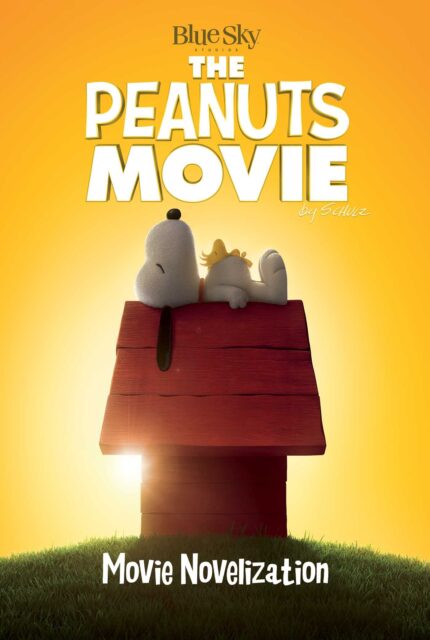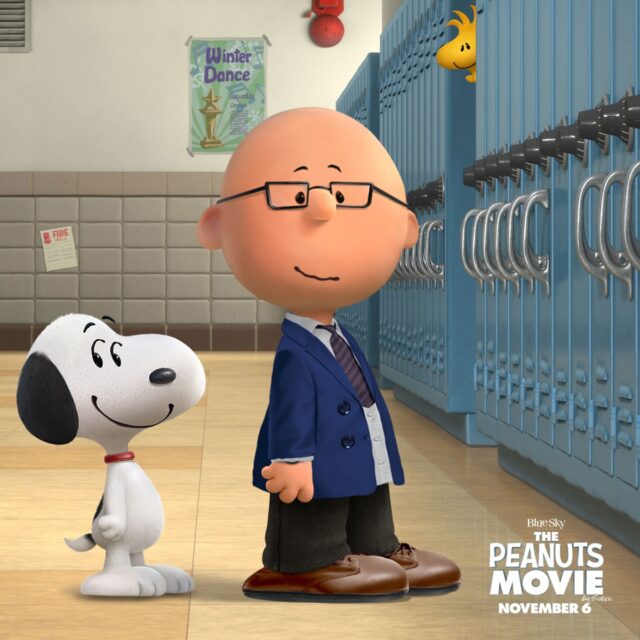The Peanuts Movie Novelization
Yesterday evening I went to the BAM! (formerly Books a Million) near York Galleria, not for any particular reason, just to get away from the gloom and the muck that had been all day Saturday thanks to the rain brought by Hurricane Joaquin.

There I found a most unexpected book - The Peanuts Movie Movie Novelization, adapted by childrens book author Tracey West. (The double “Movie” in the title is not a typo on my part; that’s what it reads on the cover and the spine.)
I’m not going to critique the book, per se; I’m well beyond the age of the book’s intended audience, and any critique would be bringing a fortysomething’s perspective on and expectations of fiction to a work that doesn’t deserve that type of scrutiny. I did feel something… strange about reading this book and engaging with the Peanuts characters through prose, but that’s my conditioning and expectations born of nearly four decades of reading these characters in comic strips or watching them on television. When I was in second or fourth grade (I skipped third), this would have been my speed. (Or maybe not. I was reading Arthur C. Clarke and Robert Heinlein and Sir Arthur Conan Doyle by fourth grade, and I’d already been to Narnia and Middle-Earth.) And the book should really be looked at in that way. It’s a book for kids.
The important thing to say about The Peanuts Movie novelization is that it’s entertaining and the book is frequently laugh-out-loud funny. West takes us inside the psyches of Charlie Brown and Snoopy, and she makes us feel for good ol’ Charlie Brown. The prose isn’t complicated, the characters behave exactly as they should, and the sense of melancholy that pervades Peanuts is present. For the elementary school reader who knows Charlie Brown and the gang from the animated specials, The Peanuts Movie Movie Novelization would be a lovely introduction to the characters.
That out of the way, I want to take some time and discuss the story, which isn’t West’s purview; she worked with the script she was given. What follows will be spoilers, and I’ll leave an LJ cut for those who wish to stop reading…
Back in June, FOX released a trailer for the film that gave some hints about the film’s story. Let me quote from the blog post I wrote about it:
My read on the trailer is that this is an origin story of sorts - the origin of Charlie Brown’s unrequited crush on the Little Red-Haired Girl. A new girl moves into Charlie Brown’s neighborhood, she’s seen a few times in shadows or at a distance in the trailer, no matter what he does Charlie Brown can’t work up the nerve to talk to her, she has red hair. Seems straightforward to me.
Also, there were some things in the trailer that struck me as not quite right:
Shermy’s presence alongside Peppermint Patty and Franklin is ahistorical (Shermy disappeared from Charles Schulz’s strip about the same time they were introduced). We also see that Peppermint Patty, Marcie, and Franklin apparently attend Charlie Brown’s school (they didn’t - they were from the other side of town and attended a different school), and Linus appears to be in the same class as Charlie Brown (he wasn’t - he was a year or two behind Charlie Brown).

These suppositions are absolutely accurate.
The story has an A-plot/B-plot structure, like the best (and worst) of Star Trek: The Next Generation. In the A-plot, Charlie Brown has a crush on his new neighbor across the street, the Little Red-Haired Girl. In the B-plot, Snoopy finds a typewriter and starts writing the Great American Novel, a war story about the World War I Flying Ace and his love of the French poodle aviatrix, Fifi. The story isn’t just “the origin of Charlie Brown’s unrequited crush on the Little Red-Haired Girl”; it’s also the origin of Snoopy as the Great American Novelist. These plots reinforce one another, but they don’t tie together.
And yes, there’s a strange, ahistorical mix of Peanuts characters in the film. Peppermint Patty, Marcie, and Franklin, who attend a school on the other side of town, are part of Charlie Brown’s class, along with Linus and Shermy, and their teacher is Miss Othmar.
I understand the creative decision that led to something like that - it’s easier to put all of the characters in the same school and the same classroom because it affords more opportunities to use the characters and have them interact.
But I can’t understand why Shermy was used at all. He is, at best, pure fan-service because he doesn’t do a single thing in the story. Don’t misunderstand me, I don’t have it out for Shermy, but he ceased being a major character a decade before I was born, and his peak moment was probably “I’m always a shepherd” in A Charlie Brown Christmas. Unless there’s a reason outside this story for his appearance - such as, “Shermy was secretly Charles Schulz’s favorite character and he always regretted not doing more with him” - he could have been dispensed with entirely.
As for the tone, the story gets it right… until the ending. Throughout, Charlie Brown is faced with a problem - how to work up the courage to have a conversation with the Little Red-Haired Girl - and he comes close to surmounting the challenge, only to fail (in his mind) in an embarassing and public way, time and again, and he’s reminded of that fact by his erstwhile friends. That’s classic Peanuts. But the ending owes more to rom-com cliches than Peanuts, and the reaction by the characters to the ending is not Peanuts at all. Unless, thirty seconds after the end it all blows up in Charlie Brown’s face, that is.
For a new audience, I think the film will work. They’re not going to be nitpicky about how it doesn’t “fit.” They’re going to see a story about overcoming life’s obstacles and learning from the process starring a group of characters that they’re probably a little familiar with. The story does work on its own terms.
For a long-time Peanuts fan of comics and animation like myself, it will probably be best to think of this as a reboot, like Brian Michael Bendis and Mark Bagley’s Ultimate Spider-Man or J.J. Abrams’ Star Trek, albeit a reboot without decompression and lens flare. I fully expect to be entertained by the film. As I said, the story does work. It’s not entirely true to Charles Schulz’s Peanuts, but as the film spools and the story unfolds I don’t think I’ll notice. I’ll just enjoy the 90 minutes with Charlie Brown and the gang.